Peer Review: “A Common Pornography” by Kevin Sampsell
 I don’t know if anyone else on this site is planning to write about my pressmate Kevin Sampsell’s new book–I hope someone is–but I feel like sharing some thoughts about it, so here goes. The main thing that strikes me is how effortless and propulsive the reading experience is. The package containing A Common Pornography (and a galley of Dennis Cooper’s Smothered in Hugs–it was like Christmas all over again!) arrived this afternoon around five, and yet, somehow, here it is a quarter after ten and I’m about three quarters through it. I read it sitting in my desk chair. I read it on the subway. I read it in the checkout line at Trader Joe’s. I read it on my couch. If I hadn’t put it down to write this blog post about it, I’d be reading it now.
I don’t know if anyone else on this site is planning to write about my pressmate Kevin Sampsell’s new book–I hope someone is–but I feel like sharing some thoughts about it, so here goes. The main thing that strikes me is how effortless and propulsive the reading experience is. The package containing A Common Pornography (and a galley of Dennis Cooper’s Smothered in Hugs–it was like Christmas all over again!) arrived this afternoon around five, and yet, somehow, here it is a quarter after ten and I’m about three quarters through it. I read it sitting in my desk chair. I read it on the subway. I read it in the checkout line at Trader Joe’s. I read it on my couch. If I hadn’t put it down to write this blog post about it, I’d be reading it now.
Now, I know that Kevin is–like me–a Richard Brautigan fan, and I think there’s a very Brautigan-y energy at work in this book. Not a Brautigan tone, mind you–Kevin’s book isn’t emo or surrealistic–but here, as in a Brautigan, the chapters are very short, typically a page or two at most, and tend to be anchored by a single image or idea. The book doesn’t demand so much as suggest your attention–hey, you wanna hear a story? Sure. The subject matter (the author’s superlatively deranged upbringing) is sometimes dark (and/or gross) but Sampsell doesn’t plea for your sympathy, he doesn’t go for pointless shocks, and he doesn’t attempt some sort of showy “defiance” or “reclamation” or whatever. He’s just this guy remembering stuff that he did or that happened to him, or to people he knew, and sort of thinking about how it was all maybe a little weirder than he thought it was at the time. Some of it’s funny, and some of it’s touching, and some of it’s sad–and a lot of it is two or more of these things at once–but I think what it really succeeds at doing is creating an atmosphere that encompasses all of those states without forcing the reader to choose one, and that too for me is very Brautigan.
So anyway, that’s my first reaction to Kevin’s book. I’m excited to see him in February, because Harper has us scheduled to do a handful of events together–we’re doing a night in Boston (2/17) and then the following two nights in NYC, and hopefully I’ll be out to see him in Portland sometime later this spring. Want to know how we met? Okay, I’ll tell you the story. We met because right before I moved to Portland, Oregon from NYC in early ’05, I found a copy of Susannah Breslin’s You’re A Bad Man Aren’t You? which he had published through Future Tense, on the bookshelf at St. Mark’s. So I emailed him to say that I was moving to his town and we should get together. He was, I think, looking for an intern, and I know that I was looking for someone to publish the mess of short stories in my backpack. So we had lunch one day near Powell’s. There are a number of ways this meeting might have ended poorly, but instead what happened was I interviewed him for Bookslut, and we’ve been friends ever since. You can read that interview here. Fun interview fact: Kevin Sampsell was the first person I ever heard mention the following names–Sam Lipsyte, Gary Lutz, Gordon Lish, Diane Williams, Amy Hempel, Tao Lin. Not bad, right?
January 15th, 2010 / 12:12 am
Sampsell. Crime. The two of em.
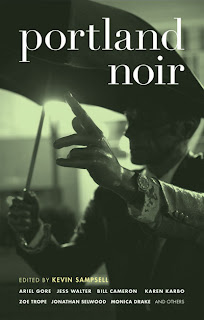
Crime in a rainy city.
Kevin Sampsell, incomparable writer/booklover, has edited a crime fiction anthology for Akashic Books: Portland Noir. Kevin, admittedly a noir noob, talks about the process over at the Powell’s blog. I’ll go ahead and reposition Kevin’s question for the HTML Giant audience: Which books in the crime/noir/mystery genre should he/I/we be reading? I recommend Dashiell Hammett.
June 15th, 2009 / 2:03 am
Down South with the Ghost of Larry Brown (guest posted by Kevin Sampsell)
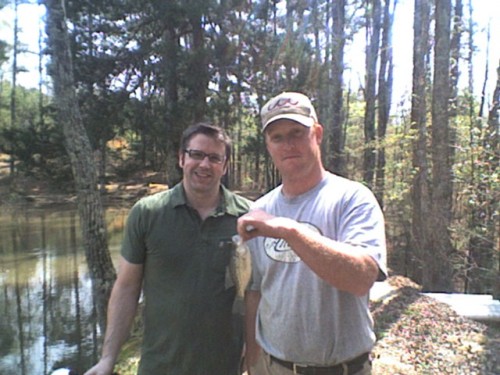
Is it weird to cry over the death of a writer? When Larry Brown died just before Thanksgiving in 2004 at the age of 53, I remember seeing the news of it on a web site and involuntarily saying “Holy shit” out loud, even though no one else was around. I didn’t cry then but I wanted to, as if my tears would represent a show of respect or offer a thank you to the man who wrote many of my favorite short stories and novels. His writing was a beautiful streamlined machine, full of blunt emotion, a subtle trashy humor, and down-on-their-luck country boys, and hard southern women. With each book, Larry’s style got tighter, more muscular. Later novels like Joe and Fay conjure up names like Flannery O’Connor and adjectives like classic and cinematic. In 1994, I saw Larry read at Powell’s Books from his memoir, On Fire. Although he didn’t like to do the book tour circuit, and often drank too much while on the road (drinking is often the favorite pastime of his characters), he was on his best behavior and was soft-spoken and gentlemanly when I asked him to sign my books. Two years later, he came back to town for his powerful revenge novel, Father and Son. For some reason, I missed that reading, but I heard he was bleary-eyed drunk and read a rape scene before plopping down to sign books for the stunned audience.
Joseph Riippi’s SUMMER READS
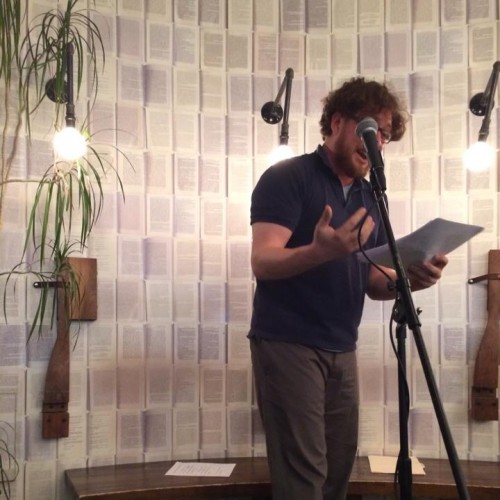
5 books Joseph Riippi is looking forward to this summer as part of this year’s Summer Reads.
***
My Struggle, Volumes I – III by Karl Ove Knausgaard
The series had me at its opening line: “For the heart, life is simple: it beats as long as it can.” I picked up the first two volumes at AWP in Seattle but only just started in and I’m loving the slow-burn reveal of this life. Volume III drops right around Memorial Day, so am hoping to being caught up by then, and then keep going.
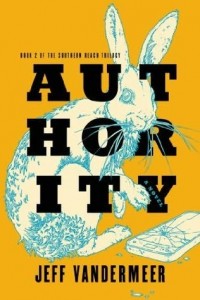
Authority by Jeff Vandermeer
I read a lot of books on buses this spring thanks to a book tour, and Vandermeer’s Annihilation—the first installment in his Southern Reach Trilogy—was one of my favorites. Its length was perfect for the ride to DC, and I just couldn’t put it down, a kind of understated post-apocalyptic thriller that was more about the characters than the post-apocalyptic landscape. Very excited for Authority, the second volume.

Scout Books Chapbooks by Chelsea Hodson, May-lan Tan, and Jay Ponteri
This is actually three books, but they’re chappys and they come out at the same time from the same place so let’s count them as one. Girly by May-lan Tan, Pity The Animal by Chelsea Hodson, and Darkmouth Strikes Again by Jay Ponteri are the next round of Scout Books from Kevin Sampsell’s Future Tense press, and are sure to be beautiful pocket-fitting objects for the summertime, nice little fistfuls of lit to sip beneath trees or on benches or while sitting under sun and waiting for your second hefeweizen at a beer garden in the early afternoon. (I have very specific plans for these, obviously).

The Histories, by Herodotus (new translation by Tom Holland)
My wife and I are going to Southeast Asia for the month of June and I won’t have room for much in the way of multiple books, so I’ve decided to bring one big, beefy tome to which I can attach the sentiment of our adventure. Plus, I’ve wanted to get into The Histories ever since first reading about it in The English Patient. The Ondaatje nerd in me is incredibly excited about filling my own Herodotus with receipts and scraps and a great deal of marginalia.
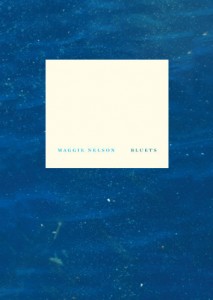
Bluets by Maggie Nelson
It’s just time.
***
Joseph Riippi’s most recent books are the novel Because and chapbook Puyallup, Washington (an interrogation), with illustrations by Edward Mullany. His next novel, Research: A Novel for Performance, is forthcoming this October from Civil Coping Mechanisms. Visit josephriippi.com.
May 19th, 2014 / 10:00 am
…….Should Publishers Pull Gregory Sherl’s Books ??…….
***
On February 4th Kevin Sampsell made the following announcement on Future Tense’s Facebook page:
In light of recent of recent allegations of abuse, we’ve decided to remove Gregory Sherl’s book, Monogamy Songs, from our catalog. We hope that all people involved can heal and find peace.
Future Tense was not, though, the first press to remove a Gregory Sherl title from its catalog. The day before KMA Sullivan had announced on YesYes Books’ Facebook page:
In light of the allegations of abuse that have unfolded over the last few days and my beliefs surrounding these allegations, I have decided to pull Gregory Sherl’s book Heavy Petting from the YesYes Books catalog. I commend the women who have come forward. My sincerest hope is that everyone involved receive the support they need.
I’ve thought about this quite a bit in the last week (and discussed it with a few people I met with during my recent trip to Oakland and San Francisco) and while I agree with and would like to echo the last part of each of these announcements (“We hope that all people involved can heal and find peace” and “My sincerest hope is that everyone involved receive the support they need”) I’d like to think that If I was in a similar position I would NOT remove the book from my catalog.
This is to say that regardless of the allegations, or my beliefs surrounding them, I think the right thing would be to continue to make the book available to those who might want to purchase it. I feel where Future Tense and YesYes are coming from in this difficult, emotionally-charged situation– but for me the book is the book and If I thought it was good enough to publish then I’d like to think I would stand by it still (even if doing so made me wince).
***
On a related note The Oregon Trail Is The Oregon Trail, by Gregory Sherl, is still available from Write Bloody Publishing.
Because by Joseph Riippi
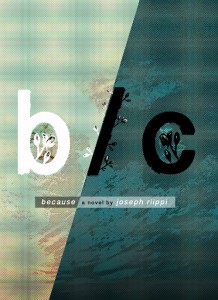 Because
Because
by Joseph Riippi
Civil Coping Mechanisms, February 2014
175 pages / $13.95 Book page at CCM / Buy from Amazon
It only takes about seven pages to begin to feel pained—even offended—by Joseph Riippi’s Because. This is primarily because every single sentence in the book (spoiler alert: except the last) begins with the words “I want.” A structure like this poses serious problems for a reader like me and like most of us, hyper-aware of the sins of heavy-handedness and bared authorial intention as we are. Because’s offenses against a readerly sensibility include:
1) Narcissism. It’s hard to like a book authored by someone who seems to speak only about himself.
Caveat: Riippi knows this. He says:
I want to feel less narcissistic for writing this.
I want to be honest in writing this, even if honesty means narcissistic feelings.
2) Melodrama/naïveté. The battle of the genuine vs. the ironic has been played out on many fields in the last few decades. I’m most acquainted with David Foster Wallace’s part in the battle for a post-postmodern literature that might be honest with the reader without being formally regressive. People mostly cite his “E Unibus Pluram” essay from A Supposedly Fun Thing I’ll Never Do Again when referring to this tension.[1]
Caveat: Riippi also knows this, and he is willing to own it.
I want you to know I mean this completely and sentimentally but unabashedly and honestly and without shame.
3) The economics. What right does a white American male with the wherewithal to write a book have wanting so many things? It would be easy to tee up Because as a “typically American” book, so focused on personal desires that it fails to consider the actual hardships of the external world.
Caveat: I’m pretty sure Riippi knows this too. Not quite as explicitly, but his desires are so robust, so myriad, that such an acknowledgment often seems implicit in them. In this section, for example:
I want better cellular reception. I want an espresso machine. I want espresso to be good for me. I want health to be delicious. I want all that is delicious to be good for me and all that is disgusting to be good for me…I want a self-filling refrigerator and self-cleaning pans and pots that never stain.
All of which is to say that Because feels to me as if it is kind of supposed to be painful to read. I came in knowing the “I want” premise of the book, expecting Because to be an experimental novel that would be a little difficult to get through. And it is that, but not in the way you think of experimental—distant from the reader, difficult in terms of breaking the code of its linguistic tricks. Instead, it is so open, bleeding, and honest that it is almost impossible to stand. This is its own kind of experimentation, I think, and an extremely valuable one—both in making us examine our readerly biases and in urging us, time after time, to transcend them by sticking with the narrator on a project, he admits, he is so unsure about.
All that said, there’s more to Because than just “its simple mantra-like structure,” as Kevin Sampsell’s blurb calls it. The book is split up into segments that are usually between one and four pages long, titled with the first line of each section. The “wants” often shift dramatically within a given section, from college-ruled paper to grandmother’s grocery lists to bioluminescent flowers, for example. But the book really begins to stride when Riippi stays on a subject for the entirety of a section, or longer. In one segment, he speaks of his friend Jenns; how as the only freshmen on the high school football team he and Jenns had their heads shaved by a guy named Gator; how Jenns took the fall after the team TP’d a cheerleader’s house; how Jenns shot himself, later, leaving an indelible mark on the narrator’s life. The narrative continuity of sections like this is striking in a work that usually shifts desires and subjects rapidly. The Jenns thread and a few others like it almost constitute a sort of home, reminding us, suddenly, how welcome such a narrowed focus can be.
But perhaps the most interesting strand that comes out of Because is a certain kind of “want” peppered across the book, especially in its later pages: the desire to live fully and dangerously in a world where our lives can often feel sanitized and certain.
I want to narrowly escape an explosion. I want to hear the sounds of falling bombs. I want to drop for cover and pray, to dig inside my helmet for a rosary or talisman, to hear over the cataclysm the prayers of all my brothers who surround me.
I want to tie tourniquets and grasp bloody hands. I want to learn the Last Rites by heart.
Passages like these feel odious at first, wildly privileged. They seem to make tragedy into a tourist attraction, commodify suffering instead of rejecting it as those who have experienced it would urge anyone to do. But upon encountering this sentiment again and again, the reader has no choice but to begin to understand it. Riippi’s speaker wants to live—and so might you, if you’re warm and safe somewhere now. It is only that Riippi is not afraid to say so.
This is a sensation that occurs more and more as you enter the book’s later pages: Riippi simply has no fear of how he will be perceived. Perhaps the most recurring image in Because is the narrator’s grandfather pounding a nail into a cedar tree with his bare hand. It is a fitting metaphor for the work Joseph Riippi has done with this book. It hurts, a lot, to read something so raw, composed with few tools besides human desire. But once you have finished—once the proverbial nail is in the tree—it is even more difficult to get it back out, to forget a book as open and rending as this.
***
[1] In another example from 1997, Wallace called David Markson’s Wittgenstein’s Mistress “a magical book, not because it alternates between incredible intellectual stunt-pilotry and pathos but because it manages to marry the two in a way that—I mean, that’s what my dream is, to someday be able to do something like that.” KCRW Bookworm interview, 1997. ~20:30.
January 24th, 2014 / 10:00 am
25 Points: This Is Between Us
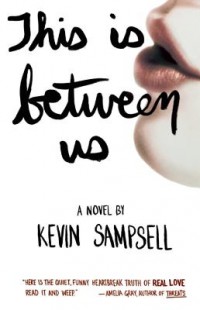 This Is Between Us
This Is Between Us
by Kevin Sampsell
Tin House Books, 2013
240 pages / $15.95 buy from Powell’s or Amazon
1. This book reminded me of this remix which was incredibly moving and pained me this spring and still pains me now http://www.youtube.com/watch?v=0KbdOBE1ORw
2. The thing about Kevin Sampsell is that he feels like the kind of guy who has been through everything. He’s just one of those people. He doesn’t have that used up feeling or look at all but he does have that vibe of being the kind of guy who has lived through basically everything there is as a human to experience but not in a hardened way.
3. I’m not explaining this right but he’s just one of those people who seems complicated and well adjusted and like if you talk to him he just has been there, whatever it is but he doesn’t come outright and say that instead he just comes from this I know what you mean mode which isn’t even patronizing the point here is that all of that also comes through in his writing and this book This Is Between Us from Tin House coming out is five years of a life.
4. Anything you have ever experienced in your life is in this book.
5. This book is comforting.
6. Sometimes this book is upsetting.
7. This book is comforting.
8. Some people said this book was disturbing and I was like have you ever lived your life at all or ever really loved someone or had a partner and if you haven’t maybe your life is easier and even if your life has been really nice you’ll still be like “yup” while reading parts of this book because it’s just so real in how it’s rendered because it’s just written so elegantly and simply stated and maybe that’s the thing with Kevin Sampsell’s writing.
9. We’re working with the rhetorical you in this entire book.
10. It’s written like a confessional ode-ish poem. READ MORE >
November 7th, 2013 / 1:06 pm
Why Did Mud Luscious Close? Getting busy with JA Tyler
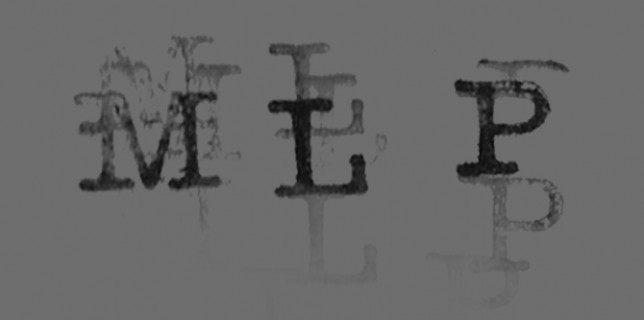
Hello, here is an interview that I did with J.A. Tyler. We started it via email soon after the announcement that his press, Mud Luscious, would have to close down. It’s fairly long. First we talk about all the things he did with MLP, then we get into the nitty gritty of what happened that caused its demise. I really appreciate that he would do this. I’ve asked other presses to do a similar post mortem but they’ve declined. It’s not easy, I know. You run a press, you feel an almost paralyzing responsibility to the people you publish. You have a book that does well, you’re fucked because your responsibilities seem to increase. It’s not a thankless job, art — not by any means — but it’s a tough one. And the place where art intersects with business IS thankless unless your strength is on the business end of things. Anyway. Get into this interview. Remember MLP for its growth and its commitment and its problems.
Hi, J. A. How are you feeling? Would it be an understatement to say you’re sad?
Yes: Sad, overwhelmed, frustrated, sick. A million things all at once.
Well, we started this interview back in April, so it’s been a while. How are you feeling about things now? Is the remorse turning to relief? Have you started to get a glimpse of what a normal life can be yet?
Normal life, probably not. There is this residual layer of guilt that I presume will take much longer to unwind from wherever it is in me. I do see how much time I spent doing MLP related things, both on the “free time” I’m now allotted and in the size of the hole it left.
Holiday Shopping Guide: Fiction Recommendations

Last week I did a Nonfiction Shopping Guide. Now I’ve got this list of fiction titles published in 2012, for all you last minute shoppers.
Like the previous list, I’m going to select twenty titles. And I’ll present them in no particular order.
These obviously represent my own interests and therefore omit plenty of titles I’m sure were great.
Also, I omitted titles by HTMLGIANT crew, despite the fact that a bunch of us have really awesome works of fiction out this year.
The Zachary German Documentary, “Shitty Youth”
Zachary German’s web presence was one I once compulsively checked-on for updates, that I consistently enjoyed, intriguing and funny, and now his web presence is gone, mostly, because he wanted it to go away.
Adam Humphreys’s new documentary, Shitty Youth, which shares a name with German’s possibly defunct “radio show”/podcast, portrays German as a willfully difficult or potentially alienating person socially who is very attuned to style and taste, the author of one novel, Eat When You Feel Sad, which got good attention and praise, who has released almost no writing since, in part because much writing, including his own, is not up to his very high standards.
November 5th, 2012 / 5:54 pm

